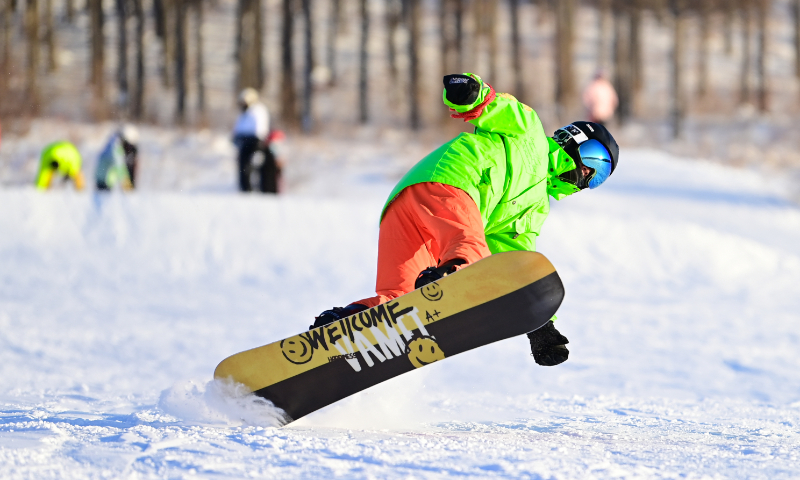
A snowboarder in Arxan, North China's Inner Mongolia, on December 24, 2022 Photo: VCG
With optimized COVID measures and many now recovering from infections, many skiers cannot wait to hit the slopes.
Hu Wei, general manager of Nanshan Ski Village in Miyun district of Beijing, told the Global Times on Monday that the ski village has been in operation for about two weeks and the daily guest volume had reached its maximum level on Christmas Eve of over 6,000.
Hu mentioned that most guests were from Beijing and made the one-day-trip at the ski village, thus the booking volume of hotels hasn't seen a significant increase. But he is looking forward to peak activity during the New Year's Day holidays and Spring Festival holidays in mid-January.
Skiers backQu, a Beijing-based skiing fan, finally made a trip to a ski resort in Zhangjiakou, North China's Hebei Province over the weekend.
"There was an obvious surge in visitors: carparks were full of cars and surrounding hotels were nearly fully booked," she told the Global Times on Monday, adding that her friend was forced to cancel their trip to the resort having failed to book a hotel room in advance.
Located 180 kilometers northwest of Beijing, Zhangjiakou hosted the Nordic skiing events as well as the bulk of the freestyle skiing and snowboard events during the Beijing 2022 Olympic Winter Games.
As more pent-up demand for traveling to ice and snow resorts is being released, local business owners are anticipating record numbers at resorts in the capital city and its surrounding areas as the New Year holiday and Chinese traditional Spring Festival draw near. The 2023 Chinese New Year falls on January 22.
Luo Xingrong, general manager at Wanlong Ski Resort located in Zhangjiakou, told the Global Times on Monday that the daily crowd numbers were only a few hundred when the resort opened in mid-November this year, and the number has recently recovered to almost 2,000.
"The past weekend has witnessed obvious increase in crowds," Luo said.
At present, hotel reservation for the New Year holiday has exceeded 60 percent of 2021 levels, and it is expected the ratio will exceed 90 percent at last.
"Although visitor numbers during the New Year holiday may not exceed that of last year, there is a high probability that this year's Spring Festival holidays will see more people compared with the same period last year," she added.
Zhao Zhankun, vice general manager at Qishan Ski Resort located in Laiyuan County, Baoding, North China's Hebei Province, said that the ski resort usually opens at the end of October, but it was one month late this year due to the epidemic prevention measures.
After optimizing and adjusting the epidemic prevention and control measures, the ski resort still needs to have a process of adaptation, but Zhao is quite confident in the business growth.
"Now more people from Beijing and nearby provinces are traveling here," Zhao told the Global Times on Monday. Over the past weekend, visitor numbers at the ski resort exceeded 2,000, an increase of 40 percent on a yearly basis.
"Seen from current reservations, there will be more visitors during the upcoming New Year holiday," Zhao said.
Olympic level enthusiasmThe Olympics has been a major shot in the arm for both the country's winter sports infrastructure and for public interest in skiing and snowboarding.
Over the past week, bookings of skiing-related hotels in Beijing increased by 99 percent from the previous week, and ticket bookings for ski resorts went up by nearly 10 percent, data from online travel agency Trip.com showed.
Apart from daily tickets, multiple ski resorts launched season passes for the 2022-2023 snow season. On November 3, Beijing Nanshan Ski Resort released a second round of season passes, with the entire allocation quickly sold out. Staff from the ski resort said the passes were snapped up in only seconds.
On Saturday, the 9th Beijing Happy Ice and Snow Season was officially launched including a series of activities that will run till April next year. In addition to organizing ice and snow events, 30,000 ice and snow coupons will be distributed to residents to encourage greater public involvement and spending.
As the first snow season after the Beijing 2022 Olympic Winter Games, public enthusiasm for winter sports has not dwindled even though the event finished almost an entire year ago.
Wen Xuexin, a representative of Zhongxin Skiing Training School in Zhangjiakou's Chongli district, told the Global Times on Monday that with the popularity of winter sports, a basic group of ski enthusiasts has formed, and it is expected that the overall flow of people across the country's ski resorts will be relatively high during the first snow season after the Olympics, ushering in a new chapter for China's winter sports economy.
About 346 million Chinese people have participated in winter sports activities since Beijing won the bid to host the Olympics in 2015, accounting for 24.56 percent of China's total population, according to a report by the National Bureau of Statistics.
China has committed to engage 300 million people in the winter sports.
The combined market value of the winter sports economy jumped by 51.88 percent year-on-year in 2021 and is expected to exceed 800 billion yuan ($113.41 billion) this year. It is likely to top 1 trillion yuan in 2025, data from a report on the development of the industry revealed.




